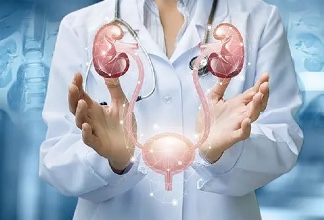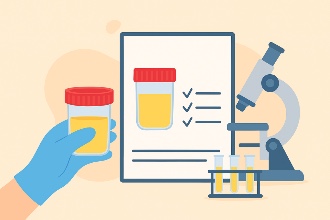
Urology is a branch of medicine that deals with the diagnosis and treatment of diseases related to the urinary tract in both men and women, as well as the male reproductive system. Urologists
are physicians who specialize in this field. They are trained in both medical and surgical treatment, meaning they can prescribe medication as well as perform procedures ranging from minor outpatient interventions to complex surgeries.
Common Conditions Treated by Urologists
Urologists diagnose and manage a wide variety of conditions. Some are common and easily treatable, while others are complex and require ongoing care.
Urinary Tract Infections (UTIs)
UTIs occur when bacteria enter the urinary tract, often through the urethra. They are especially common in women but can affect anyone.
Symptoms:
* Burning sensation when urinating
* Urgent or frequent need to urinate
* Cloudy or foul-smelling urine
* Pelvic or lower back pain
Kidney Stones
These are solid masses made of crystals, typically from calcium, oxalate, or uric acid. They form in the kidneys and can travel through the urinary tract, causing intense pain.
Symptoms:
* Severe back or side pain
* Blood in the urine
* Nausea or vomiting
* Pain during urination
Treatments may include:
* Increased fluid intake
* Medications to help pass the stone
* Shock wave therapy (lithotripsy)
* Surgical removal
Benign Prostatic Hyperplasia (BPH)
This is a non-cancerous enlargement of the prostate that commonly affects men over age 50.
Symptoms:
* Weak urine stream
* Difficulty starting or stopping urination
* Frequent urination, especially at night
* Feeling like the bladder isn’t fully empty
Treatments include:
* Medications
* Minimally invasive procedures
* Surgery (e.g., TURP)
Prostate Cancer
Prostate cancer is one of the most common cancers in men. It typically grows slowly, but early detection is key to successful treatment.
Screening methods include:
* PSA (prostate-specific antigen) blood test
* Digital rectal exam (DRE)
* MRI and biopsy if needed
Treatment options vary and may include:
* Active surveillance
* Surgery (prostatectomy)
* Radiation therapy
* Hormone therapy
Bladder Control Issues and Incontinence
Incontinence can be due to a weak bladder, nerve issues, prostate problems, or childbirth complications in women.
Types include:
* Stress incontinence (leaking with coughing or sneezing)
* Urge incontinence (strong, sudden need to urinate)
* Overflow incontinence (bladder doesn’t empty fully)
Management:
* Lifestyle changes
* Pelvic floor exercises
* Medications
* Surgery or medical devices
Male Infertility
Infertility in men can result from low sperm count, poor sperm motility, varicoceles (enlarged veins in the scrotum), or hormone imbalances.
Urologic evaluation includes:
* Semen analysis
* Hormone testing
* Imaging studies
* Surgical options like varicocele repair or sperm retrieval
Erectile Dysfunction (ED)
ED is the consistent inability to achieve or maintain an erection sufficient for intercourse.
Causes include:
* Diabetes
* Cardiovascular disease
* Hormonal imbalances
* Psychological factors
* Medications or surgery
Treatments range from:
* Oral medications
* Vacuum erection devices
* Injections or suppositories
* Penile implants
Pediatric Urology
Children may also need urological care for:
* Congenital abnormalities
* Bedwetting
* Urinary tract infections
* Undescended testicles
Pediatric urologists are specially trained to care for these younger patients in a child-friendly
way.
Diagnostic Tools and Procedures in Urology
Urologists use several tools and tests to diagnose and monitor urologic conditions:
* Urinalysis
* Blood tests
* Ultrasound, CT scans, and MRI
* Cystoscopy (a thin tube with a camera inserted into the bladder)
* Urodynamic testing (measures how well the bladder holds and empties urine)
* Biopsy (removing tissue for lab analysis)
Urology Treatments and Surgeries
* Medication therapy for infections, overactive bladder, and BPH
* Catheterization for bladder drainage
* Shockwave lithotripsy for kidney stones
* Endoscopic procedures
* Laparoscopic and robotic surgeries (for prostate, kidney, and bladder conditions)
* Open surgeries for more complex cases
What to Expect During a Urology Visit
Medical History: Discussion of symptoms, medications, and health history.
Physical Exam: May include a genital or pelvic exam, and in men, a prostate exam.
Diagnostic Testing: Urine test, blood test, imaging studies.
Discussion of Findings: The urologist will explain your condition and treatment options.
Follow-up Plan: Depending on the diagnosis, additional tests or treatment may be scheduled.
Tips for Maintaining Urological Health
Good urological health starts with preventive care and healthy habits:
* Drink plenty of water: Aim for 6–8 glasses a day to help flush the urinary system.
* Avoid smoking: It increases the risk of bladder and kidney cancer.
* Maintain a healthy weight: Obesity is linked to several urologic conditions.
* Do regular checkups: Especially for men over 50 for prostate health.
* Watch your salt and caffeine intake: These can irritate the bladder.
Via Premium Travel
Urological health is an important part of your overall well-being. From everyday concerns like UTIs and kidney stones to more complex issues like infertility and cancer, urologists are here to help patients regain comfort, function, and quality of life.
Here with Via Premium Travel, our dedicated urology team provides personalized care for every patient. Whether you're seeking preventive care or treatment for a serious condition, we’re here to guide you every step of the way.


Other Posts
 Cervical Cancer Awareness Month: Prevention and Early Detection
Cervical Cancer Awareness Month: Prevention and Early Detection
 The Hollywood Smile: A Detailed Step-by-Step Guide
The Hollywood Smile: A Detailed Step-by-Step Guide
 Hollywood Smile: Transform Your Smile
Hollywood Smile: Transform Your Smile
 Thigh Lift Surgery (Thighplasty): Sculpt Firmer Thighs
Thigh Lift Surgery (Thighplasty): Sculpt Firmer Thighs
 Tummy Tuck (Abdominoplasty)
Tummy Tuck (Abdominoplasty)
 Body Contouring: Reshape Your Body, Restore Your Confidence
Body Contouring: Reshape Your Body, Restore Your Confidence
 Planning Your Health in Advance: Medical Checklists for the New Year
Planning Your Health in Advance: Medical Checklists for the New Year
 New Year 2026: Start the Year Healthier and Happier
New Year 2026: Start the Year Healthier and Happier
 Dermal Fillers: Restore Your Youth
Dermal Fillers: Restore Your Youth
 Septoplasty: Breathe Freely Again
Septoplasty: Breathe Freely Again








